Boro smile cut short
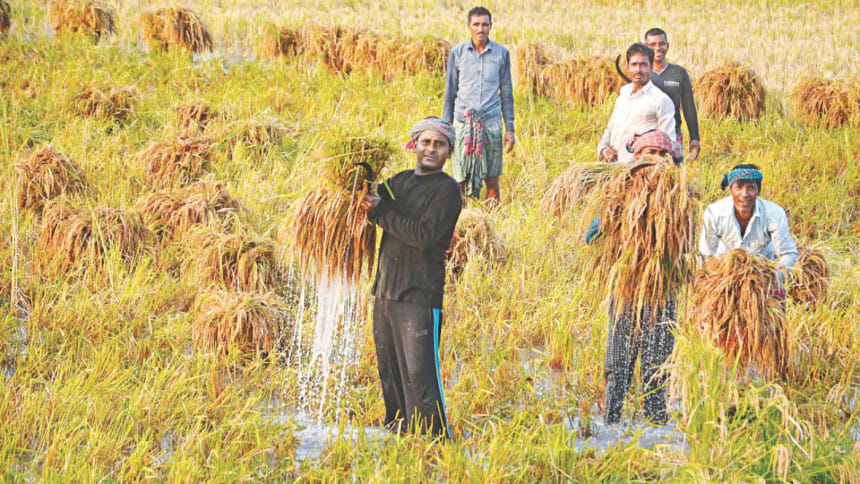
“The pain of losing the paddy that was within the very reach of our hands is unbearable.”
Hossain Ali
A farmer of Chalan Beel area
When farmers in Chalan Beel area mould their dreams of Boro harvest, they keep in mind the risks of natural calamities and the need to sow early for reaping the crops before monsoon floods.
This year, they could not harvest Boro as planned. It's because they were late in planting the seedlings owing to the delay in retreating of water from the biggest wetland in the northwest region.
And now, they are paying the price.
In Chalan Beel area, where bright sheaves of paddy waved in the winds bringing smile to the farmers even a week ago, storms have now flattened most of the crops and many fields have gone under water putting farmers in distress.
The case has been the same in several other districts in this Boro season, which accounts for more than half of 3.47 crore tonnes of rice produced every year.
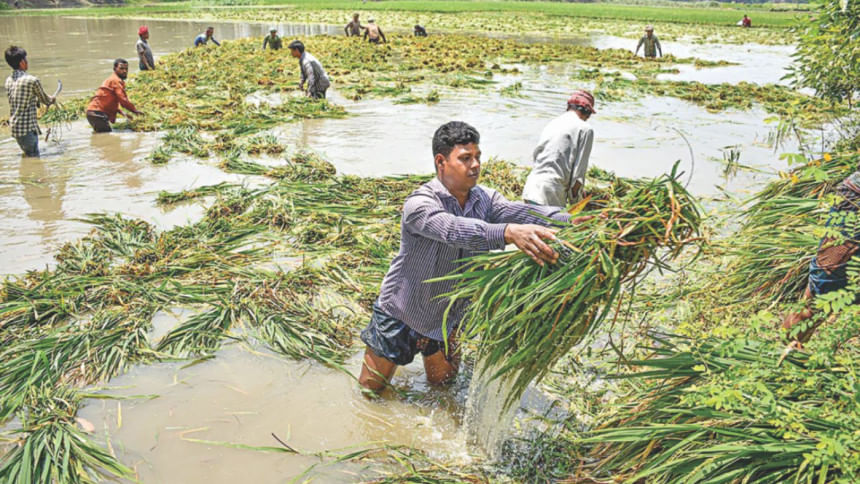
“The pain of losing the paddy that was within the very reach of our hands is unbearable. Paddy in the fields was almost ripe and I left some paddy in the fields for drying after harvest. It rained darkening the sky all day and flooded all my paddy lands,” Hossain Ali, a farmer who grew paddy on 3.64 hectares in a Chalan Beel area, told The Daily Star.
In his desperate bid to save his crops, Ali on May 6 employed some farm workers at higher rates for harvesting the produce that was almost submerged.
“Since the beginning of the season, I had been hoping to gather 30 maunds of paddy. But I could recover only half of that,” said a depressed Ali.
Aiming for good prices in the domestic market, farmers planted paddy on 49.5 lakh hectares this year, up from 44.76 lakh hectares last year, according to the Department of Agricultural Extension (DAE).
Harvesting of the irrigated rice typically starts in April and continues until the end of May. Until the third week of last month, farmers, agricultural workers and traders were upbeat about a good harvest this season.
However, recurrent rains and storms during the peak harvesting season have dampened dreams of thousands of farmers of bagging bumper crop this year. Growers fear losses for fall in yields.
Until May 7, 42 percent of the Boro crops were harvested. In haor areas in the northeast, 91 percent of crops were harvested, according to DAE estimates.
In the northwest divisions of Rajshahi and Rangpur, which accounts for 35 percent of total Boro rice output, farmers have harvested about 20 percent of paddy.
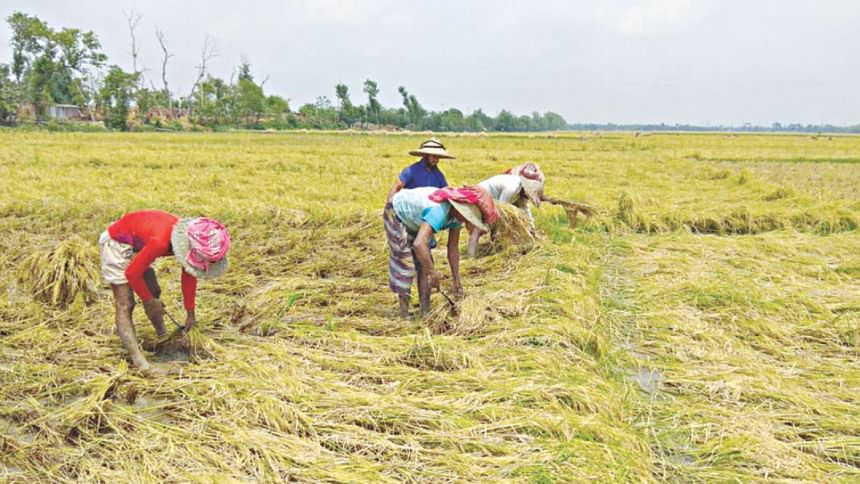
Romiz Uddin, a farmer in Tangail's Nagarpur, one of the major Boro growing districts, said though paddy have become mature in his fields, he cannot harvest the crop due to storm and rain.
"At least three days of sunlight is needed at a stretch for harvesting, drying and crushing paddy," he said.
Rafiq Miah, another grower in the district, said water level has increased in rivers and water bodies due to rain in the last few days, submerging ripe and half-ripe paddy in low lying areas.
"The crop will rot if the weather condition does not improve and the paddy is not harvested in two or three days," he said.
Apart from paddy fields going under water, rains, winds and storms have flattened paddy in the fields in Rajshahi, Naogaon, Tangail, Gaibandha, Chapainawabganj, Pabna, Moulvibazar, Faridpur and Pirojpur, a condition called lodging.
In the northeast district Moulvibazar, paddy on a vast tract of low-lying areas along the Hakaluki Haor area have been lodged, raising fear of losses among farmers for the second consecutive year.
Growers were seen harvesting paddy one to two feet under water and carrying the crop in boats.
To save the crop from further damage, many farmers are harvesting even half-ripe paddy by paying higher wages to farm labourers, report our correspondents in the districts.
Yet not all are getting farm workers due to their high demand. Besides, many agricultural workers don't want to work in the fields during cloudy weather due to fear of lightning strikes.
And those who have managed to get workers are struggling to dry their crop owing to recurrent rainfall. Many growers are drying and threshing their crop on road for dearth of dry land in their localities.
Such scenes were seen in Gaibandha and Chapainawabganj.
“With heavy shower for the last two days, my two bighas of Boro fields went under water and I was compelled to harvest half-ripe crops,” said Golzar Rahman, a grower in Shaghata upazila of Gaibandha, another major Boro producing district.
“And now, I am facing problems in processing the crop,” he said, pointing to the need for drying harvested paddy as quickly as possible.
“But we are facing trouble for want of sunlight, because the sky remains overcast all day,” said Ramjan Ali, another farmer of the district.
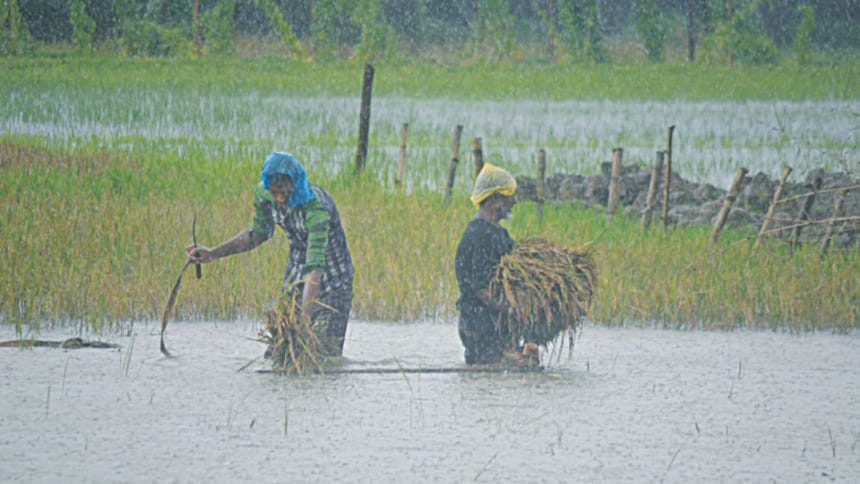
Moslem Uddin, a small farmer in Sujanagar upazila of Pabna, has more troubles. He can neither dry the harvested paddy stacked in his home nor can he harvest the rest in the field because of unfavourable weather.
In the face of such problems, many growers are forced to sell their produce at low prices.
Baser Ali, a farmer in Fulchhari upazila in Gaibandha, is one of them. He had to sell wet paddy at Tk 520 per maund as he could not find proper place to dry them.
“At the beginning of the season, we could sell one maund of paddy at Tk 800. But it has come down below TK 700 now,” said Aminul Islam, a grower in Pirojpur sadar upazila of Pirojpur, a southern district.
DAE STATISTICS
The DAE recorded partial damages on 60 hectares of lands in the Chalan Beel areas.
However, 11,000 hectares of Boro lands in Rajshahi, including in Tanore upazila's Beel Kumari, 9,000 hectares in Naogaon and 721 hectares in Chapainawabganj, have been affected by rainfall and storms, said officials.
Farmers said the extent of the damage would be bigger.
The DAE was yet to estimate the total area of Boro crop that is having water logging or lodging.
DAE Director General Mohammad Mohsin said bad weather delays harvesting in many areas. “We are suggesting growers to harvest the paddy if 80 percent of the crop is ripe,” he said.
Md Shahjahan Kabir, director general of Bangladesh Rice Research Institute, said ripe paddy would not be affected even after plants go under water.
“Paddy in hard dough condition may be damaged to some extent owing to lodging and submerging. However, the extent of crop losses would be minimal,” he said.
Including the losses for blast attack on around 2,000 hectares before,
the total amount of losses would not be over 5,000 tonnes, said Kabir.
“We expect yields this year higher than the previous year. We would be able to cross the milestone of bagging 2 crore tonnes of crops this year if we can harvest them properly,” he said.
He said yields would not be affected by rainfall if the paddy matures.
Former BRRI DG Jiban Krishna Biswas said yield of crops would not be affected significantly if the crops are lodged after their maturity. But it may affect the quality, he added.
Many growers are selling away their crops at very low prices because of deterioration in quality, said
Nirod Boron Saha, president of Dhan O Chal Arathdar Babshayee Samity, an association of rice wholesalers and commission agents in Naogaon, said bad weather would affect the overall yield.
“We see attack of pests in many paddies. This could be overcome if we get enough sun. But the weather is unfavourable,” he said adding that
“With the bad weather, prospect of a bumper Boro harvest is fading.”
(Our correspondents in Rajshahi, Tangail, Gaibandha, Chapainawabganj, Pabna, Moulvibazar Faridpur and Pirojpur contributed to this report)

 For all latest news, follow The Daily Star's Google News channel.
For all latest news, follow The Daily Star's Google News channel. 


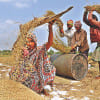
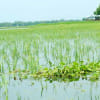
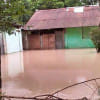



Comments